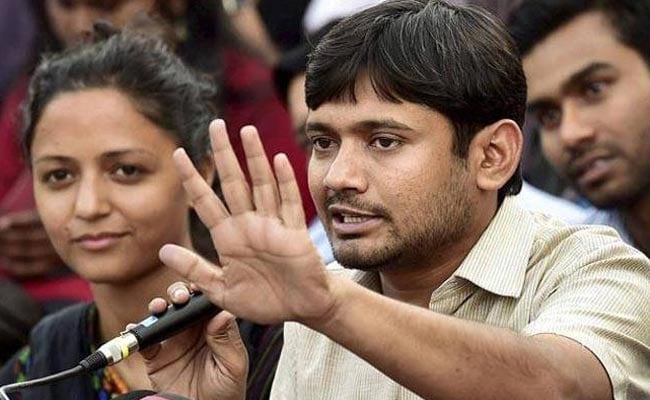
JNUSU president Kanhaiya Kumar said the government is trying to destroy the education system in India. (File photo)
New Delhi:
Jawharlal Nehru University Students' Union (JNUSU) president Kanhaiya Kumar, who is out on bail in a sedition case in connection with an event on campus, today said finishing his PhD is now more of a "political responsibility" for him rather than an academic one.
"The recent controversy which not only tagged us as being involved in anti-national activities but also framed the entire university in the that light.
"Questions are being raised about taxpayers money being spent on us and why our PhDs are taking so long and subsidies being given to us..so it has now become more of a political responsibility on me than being an academic mandate," he said during a conclave here organised by the Centre for Policy Analysis.
Addressing the audience on the topic "Universities: Crushing dissent, equity and public funding", the 29-year-old researcher said the government is trying to destroy the education system in India.
"Every government in India has tried to destroy the education system. Because through education people learn to express dissent and start asking questions. Then they no longer remain students but become prospective political opponents," he said.
Mr Kumar along with fellow students Umar Khalid and Anirban Bhattacharya was arrested in February in a sedition case in connection with an event on campus against hanging of Parliament attack convict during which anti-national slogans were allegedly raised. They are out on bail now.
The university had imposed varying punishments ranging from rustication to financial penalties and hostel debarment on 21 students in connection with the event on basis of investigation by a five-member committee.
The students went on a hunger strike which was called off on the 16th day after Delhi High Court ordered a conditional stay on punishments.
Mr Khalid, who was rusticated for one semester and slapped with a fine of Rs 20,000, said during the conclave that the universities at present are being reduced to prisons where students are being punished for raising their voices.
"A university which doesn't allow dissent is no less than a prison and this government is turning varsities into jail. Funds are being reduced, fellowships are being denied and anybody not toeing their line is branded anti-national," he said.
"The recent controversy which not only tagged us as being involved in anti-national activities but also framed the entire university in the that light.
"Questions are being raised about taxpayers money being spent on us and why our PhDs are taking so long and subsidies being given to us..so it has now become more of a political responsibility on me than being an academic mandate," he said during a conclave here organised by the Centre for Policy Analysis.
Addressing the audience on the topic "Universities: Crushing dissent, equity and public funding", the 29-year-old researcher said the government is trying to destroy the education system in India.
"Every government in India has tried to destroy the education system. Because through education people learn to express dissent and start asking questions. Then they no longer remain students but become prospective political opponents," he said.
Mr Kumar along with fellow students Umar Khalid and Anirban Bhattacharya was arrested in February in a sedition case in connection with an event on campus against hanging of Parliament attack convict during which anti-national slogans were allegedly raised. They are out on bail now.
The university had imposed varying punishments ranging from rustication to financial penalties and hostel debarment on 21 students in connection with the event on basis of investigation by a five-member committee.
The students went on a hunger strike which was called off on the 16th day after Delhi High Court ordered a conditional stay on punishments.
Mr Khalid, who was rusticated for one semester and slapped with a fine of Rs 20,000, said during the conclave that the universities at present are being reduced to prisons where students are being punished for raising their voices.
"A university which doesn't allow dissent is no less than a prison and this government is turning varsities into jail. Funds are being reduced, fellowships are being denied and anybody not toeing their line is branded anti-national," he said.
Track Latest News Live on NDTV.com and get news updates from India and around the world

